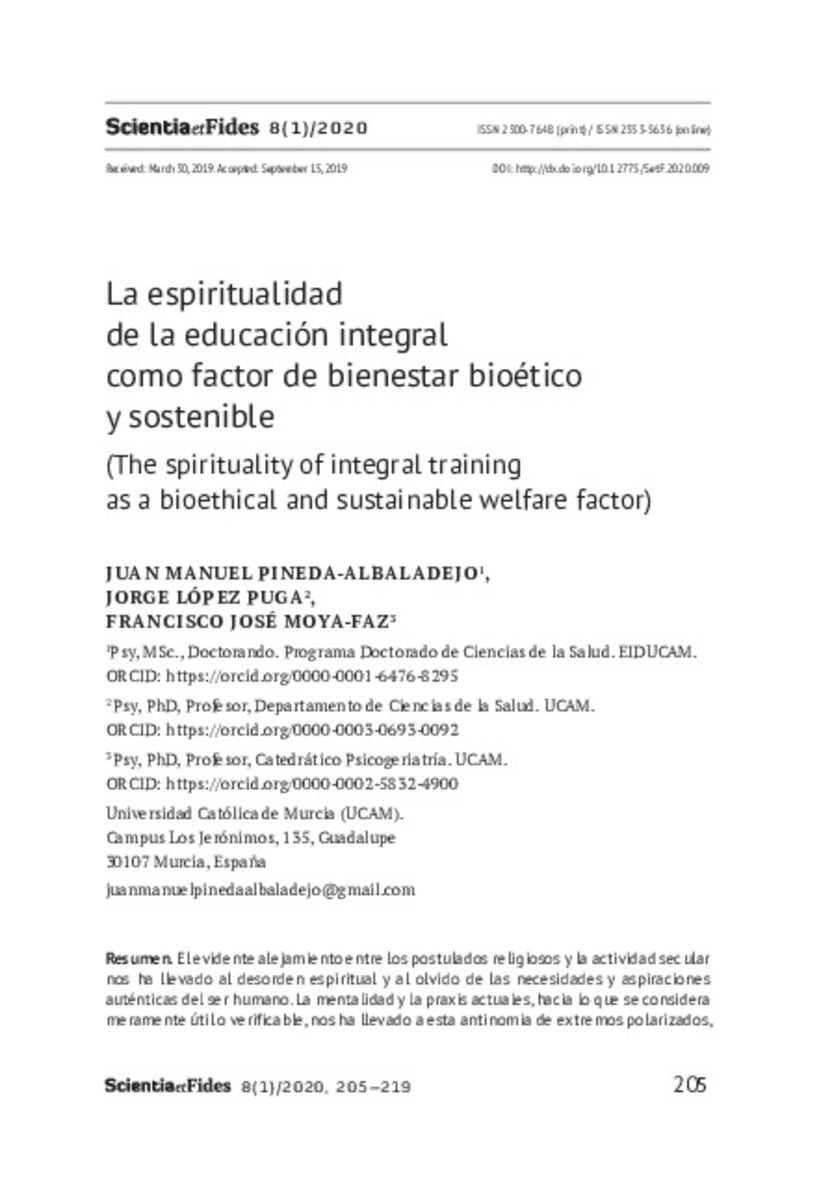Full metadata record
| DC Field | Value | Language |
|---|---|---|
| dc.creator | Pineda-Albaladejo, J.M. (José Manuel) | - |
| dc.creator | López-Puga, J. (Jorge) | - |
| dc.creator | Moya-Faz, F.J. (Francisco José) | - |
| dc.date.accessioned | 2021-11-10T09:31:34Z | - |
| dc.date.available | 2021-11-10T09:31:34Z | - |
| dc.date.issued | 2020 | - |
| dc.identifier.citation | Pineda-Albaladejo, J.M. (José Manuel); López-Puga, J. (Jorge); Moya-Faz, F.J. (Francisco José). "La espiritualidad de la educación integral como factor de bienestar bioético y sostenible". Scientia et Fides. 8 (1), 2020, 205 - 219 | es |
| dc.identifier.issn | 2300-7648 | - |
| dc.identifier.uri | https://hdl.handle.net/10171/62507 | - |
| dc.description.abstract | El evidente alejamiento entre los postulados religiosos y la actividad secular nos ha llevado al desorden espiritual y al olvido de las necesidades y aspiraciones auténticas del ser humano. La mentalidad y la praxis actuales, hacia lo que se considera meramente útil o verificable, nos ha llevado a esta antinomia de extremos polarizados, ya sea hacia un antropocentrismo que sobrevive en una felicidad paradójica, desproporcionada en la búsqueda de lo estrictamente tangible, o hacia un discurso económico o ecológico que olvida la idea ontológica, y el auténtico valor y significado del ser humano. Desde un análisis positivo y normativo, este estudio pretende enfatizar la importancia de la llamada Educación Integral, impartida por algunos centros universitarios, como promotora del bienestar psicológico y espiritual, así como de las actitudes de emprendimiento sostenible, de forma ética y responsable. | es_ES |
| dc.description.abstract | The evident remoteness between the religious postulates and the secular activity has led us to spiritual disorder and the oblivion of the authentic needs and aspirations of the human being. The current mentality and practice, towards what is considered merely useful or verifiable, has led us to this antinomy of polarized extremes, either towards an anthropocentrism that survives in a paradoxical happiness, dispro-portionate in the search for the strictly tangible, or towards an economic or ecological discourse that forgets the ontological idea, and the authentic value and meaning of the human being. From a positive and normative analysis, this study aims to emphasize the importance of the so-called Integral Training, taught by some university centers, as a promoter of the psychological and spiritual well-being, as well as the attitudes of sustainable entrepreneurship, in an ethical way and responsible. | es_ES |
| dc.language.iso | spa | es_ES |
| dc.publisher | Uniwersytet Mikołaja Kopernika | es_ES |
| dc.rights | info:eu-repo/semantics/openAccess | es_ES |
| dc.subject | educación integral | es_ES |
| dc.subject | ética | es_ES |
| dc.subject | emprendimiento | es_ES |
| dc.subject | sostenibilidad | es_ES |
| dc.subject | universitarios | es_ES |
| dc.subject | entrepreneurship | es_ES |
| dc.subject | ethics | es_ES |
| dc.subject | integral training | es_ES |
| dc.subject | sustainability | es_ES |
| dc.subject | university | es_ES |
| dc.title | La espiritualidad de la educación integral como factor de bienestar bioético y sostenible | es_ES |
| dc.title.alternative | The spirituality of integral training as a bioethical and sustainable welfare factor | es_ES |
| dc.type | info:eu-repo/semantics/article | es_ES |
| dc.identifier.doi | http://dx.doi.org/10.12775/SetF.2020.009 | - |
| dadun.citation.endingPage | 219 | es_ES |
| dadun.citation.number | 1 | es_ES |
| dadun.citation.publicationName | Scientia et Fides | es_ES |
| dadun.citation.startingPage | 205 | es_ES |
| dadun.citation.volume | 8 | es_ES |
Files in This Item:
Statistics and impact
Items in Dadun are protected by copyright, with all rights reserved, unless otherwise indicated.






